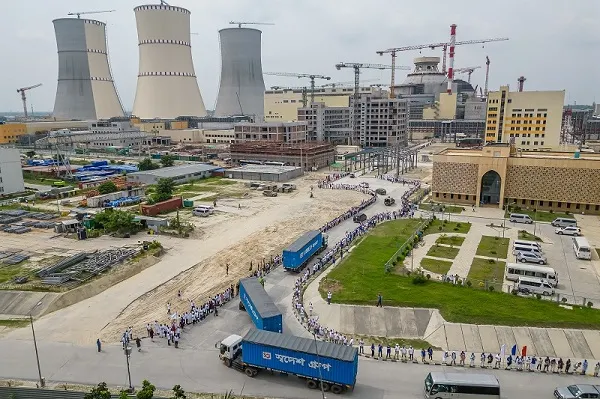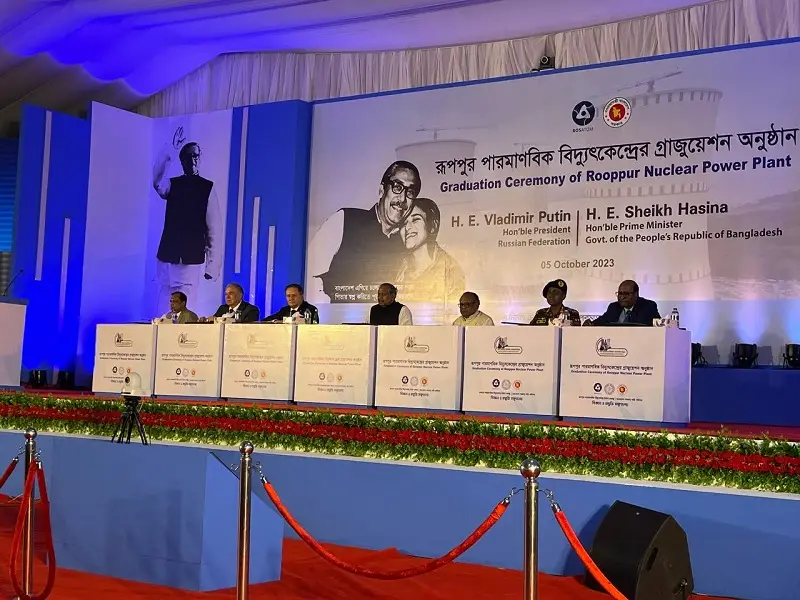

Nuclear fuel from Russia was transported to Bangladesh's Nuclear Power Plant site in Rooppur amidst tight security, a few days ago (All images courtesy: Russian State Atomic Energy Corporation Rosatom)
Bangladesh Prime Minister Sheikh Hasina on Thursday thanked Prime Minister Narendra Modi for consistent support as she, along with Russian President Vladimir Putin, virtually attended the ceremony to mark the delivery of Russian-made nuclear fuel to power Unit No. 1 of country’s maiden Nuclear Power Plant (NPP) in Rooppur.
The Rooppur NPP in the province of Pabna, being constructed by Russian State Atomic Energy Corporation Rosatom on the basis of an intergovernmental agreement signed in 2011, will consist of two generation III+ reactors with a total capacity of 2,400 megawatts. The physical launch of the first unit is expected as early as next year, and the second in 2025.
“Today is a source of special pride and joy for the people of Bangladesh. The delivery of nuclear fuel to the Rooppur Nuclear Power Plant, which was the result of the tireless work of the Awami League government, has allowed us to achieve a new result in the construction of the plant,” said Hasina in her address.


As leaders of the two countries gave a symbolic permission for the delivery of the nuclear fuel to the NPP construction site, Hasina thanked New Delhi which is playing a major role in the historic project.
“Many thanks also to the Prime Minister of India Narendra Modi for his support in the implementation of this project,” said the Bangladesh PM.
With civil nuclear cooperation between India and Russia also being an important component of the India-Russia Special and Privileged Strategic Partnership through the Kudankulam Nuclear Power Plant in Tamil Nadu, Hasina stated that since there is a similar project in “friendly India”, Dhaka had sent some of its Rooppur NPP staff there for training.
Russian President Putin too acknowledged India’s contribution in the construction of first nuclear power plant in Bangladesh.
“Our Indian friends, whose companies are participating in the construction on a subcontract basis, are also providing assistance in the implementation of the project,” mentioned Putin in his speech.
Once at full design capacity, the plant will be able to supply about 10 per cent of Bangladesh’s energy consumption.
“Ten per cent is a lot — meeting the energy needs of Bangladesh’s growing economy. And thereby the country’s dependence on coal and gas generation will be reduced, which will optimize the national energy balance. And of course, the new nuclear power plant will no longer emit carbon dioxide into the atmosphere, which will have a beneficial effect on the environment, on human health, and on the health of the nation,” added Putin.
The ceremony dedicated to the delivery of the first batch of nuclear fuel was also attended by Rafael Grossi, the Director General of International Atomic Energy Agency (IAEA), virtually. Director General of Rosatom State Corporation Alexey Likhachev and Architect Yeafesh Osman, the Minister of Science and Technology of Bangladesh, besides several other guests were present at the site for the event.
Calling it an “auspicious” and “historical” day, Hasina said that Bangladesh has overcome all adversities and is a role model for the whole world today.
“I would like to pay tribute with deep respect to the memory of the best Bengali of all time – the Father of the Nation Bangabandhu Sheikh Mujibur Rahman, as well as four national leaders, three million heroes in the struggle for independence, two hundred thousand humiliated mothers and sisters.
“Sheikh Mujibur Rahman wanted to build a nuclear power plant in Bangladesh with the help of Russia – precisely with the help of Russia,” remarked Bangladeshi PM.
The fuel for Rooppur NPP was manufactured in Russia at Novosibirsk Chemical Concentrates Plant (NCCP), an enterprise of Rosatom’s Fuel Division. The fuel manufacture and transportation was performed under guidance and supervision of Bangladesh Atomic Energy Regulatory Authority (BAERA).
More than 20,000 specialists are involved in the work at the Rooppur site, with more than 4,000 of them being Russian citizens.
Putin assured that the construction of the station and its preparation for operation is being carried out in “strict compliance” with the rules and recommendations of the IAEA.
“And, of course, Russia is not just building a station – we will provide assistance to Bangladeshi partners throughout the entire life cycle of a nuclear project, including obligations for the long-term supply of reactor fuel, maintenance of the nuclear power plant, as well as for the management of spent nuclear material,” said the Russian President.
Also Read: Russia gears up to build mini nuclear power plants in Sri Lanka
The Border Security Force (BSF) Director General Daljit Chawdhary on Friday met with Union Home…
By Shailesh Yadav Google Gemini, the generative artificial intelligence tool of technology major Google, can…
Union Home Minister Amit Shah spoke with Chief Ministers on Friday and asked them to…
Raja Abid, Chairman of the Revolutionary Students Organisation, has condemned the deteriorating education system in…
Tibetans-in-exile in Shimla observed the 36th birthday of the 11th Panchen Lama, Gendhun Choekyi Nyima,…
Leaders of the Baloch Yakjehti Committee (BYC), currently held in Huda Jail in Quetta, have…